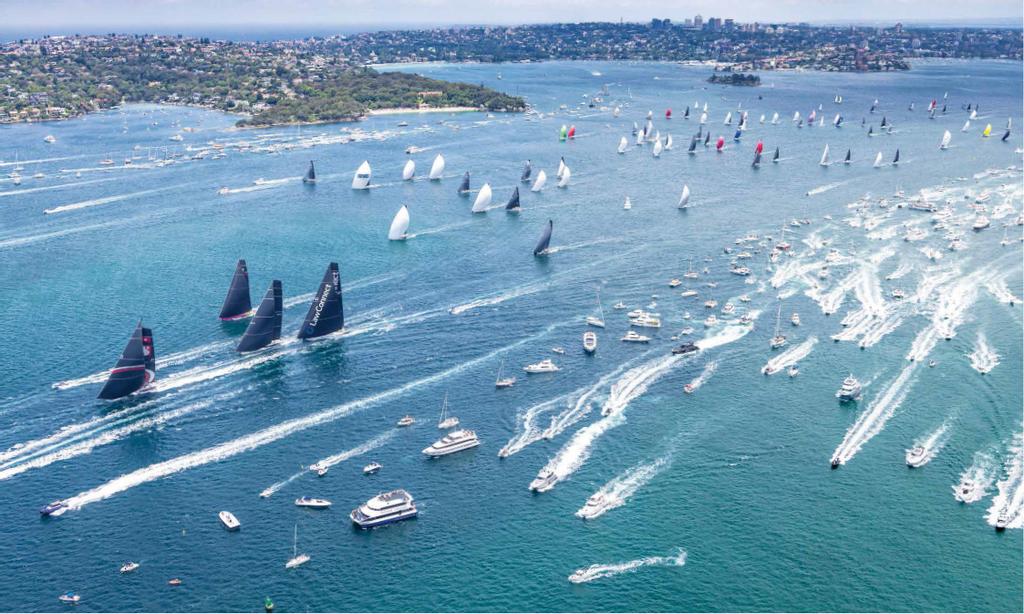Tactics for the larger yachts and the chasing pack of maxis and TP52s included staying east of the lay line to benefit from the East Australian Current, and slowing these huge canting keelers down to match the wave motion slamming into them. The smaller vessels sought shelter inshore, but it didn’t help them much as about a dozen retired during the early part of the race. Skipper Grant Chipperfield on Joker on Tourer, a Cruising Elliot 1250 in the doublehanded division, said: “Lots of storm activity, so a bumpy night where we saw 45 knots of wind about 30 miles off the coast; we had one reef in the mainsail. Not much sleep.” Nevertheless, the Victorian yacht with crewman Peter Dowdney prevailed, finishing fourth over the line.
The weather mayhem caused several inadvertent emergency beacon alerts from individual crew Personal Locator Beacons, which had to be notified to rescue services. However, one beacon false alarm was to prove costly for handicap contender, the TP52 Celestial, which didn’t respond to race authorities on emergency VHF channel 16 as required by race rules. Race authorities asked the nearest yacht, fellow TP52 Ichi Ban, to contact Celestial — who also got no response via VHF — until flares were eventually fired. This clear rule breakage, and protest by Ichi Ban and the race committee, led to Celestial being penalised by 40 minutes and losing out on the coveted Tattersall Cup handicap trophy. The Cup instead went to Ichi Ban and owner Matt Allen, his third handicap win with this Botindesigned 52-footer.
“A devastating moment,” said crestfallen skipper Sam Haynes, who said he respected the jury’s decision, but that it was a “very, very difficult penalty to swallow.” Haynes said he’d been trying to win the race for 10 years.
For veteran Matt Allen it was vindication for yet another immaculately done campaign with his mix of professional crew, including world class Australian navigator Will Oxley.
“Most races to Hobart test the entire boat and crew, but this year probably more than ever. The wave conditions we saw through the first 24 hours really caused big issues for the boats. Then to have that very complicated tactical situation for the rest of the race really [meant] decisionmaking was absolutely critical,” Allen said.

BACKLESS WAVES
Elsewhere, the smaller crewed yachts continued to retire with gear damage during days two and three. Approaching the Bass Strait, the smaller yachts reported the infamous backless waves that caused boats to simply fall off their crests, threatening hull damage, so had to be taken at an angle to minimise impact. This included the newest yacht in this year’s fleet, the fancied scow bowed Class 40 Eora. Owned by Rupert Henry with Greg O’Shea, it is a 2021 launched Marc Lombard design. A broken backstay ended their campaign to win the double-handed division.
For the double-handers, the early conditions were too much for their autopilots to steer. “We effectively hand-steered the whole way to Hobart,” said line honours skipper Rob Gough of Sidewinder. Despite having a powerfully wide and twin keeled modern Marc Lombard design, they were beaten for handicap honours by the more traditional J/99 Disko Trooper_Contender Sailcloth crewed by Jules Hall and sailmaker Jan ‘Clogs’ Scholten from the Double Bay Sailing Club in Sydney.
The smallest yacht in the fleet, the army run Gun Runner, bravely fought on through the conditions, only to retire off northern Tasmania. Ahead of it was the last finisher Solveig, a 71-year-old Halvorsen 36, designed, built and raced by the equally famous seafaring Halvorsen brothers, crossed the finish line at 08:42.11am on Saturday 1 January after seven days at sea, much to the delight of weary skipper John Whitfeld. “The first couple of days and nights we had to batten down the hatches, but she looked after us. We found a couple of dead spots on the course after that and parked a couple of times.”
